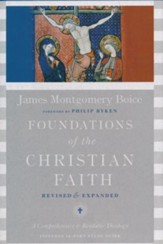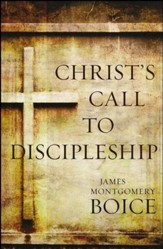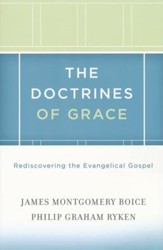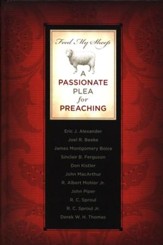
Quotes by James Montgomery Boice
Instead of trying to find loopholes in God’s commandment or trying to convince ourselves that our spouse is not a Christian or is at least not behaving as one and therefore divorceable, we ought to be shouting the holiness of marriage from the housetops. It is better to endure much personal unhappiness than to treat as expendable the solemn vows of the wedding service.
We are to believe and follow Christ in all things, including His words about Scripture. And this means that Scripture is to be for us what it was to Him: the unique, authoritative, and inerrant Word of God, and not merely a human testimony to Christ, however carefully guided and preserved by God. If the Bible is less than this to us, we are not fully Christ’s disciples.
The wrath of God is not ignoble. Rather, it is too noble, too just, too perfect – it is this that bothers us.
In the days of hardship, particularly persecution, those who are in the process of becoming Christians count the cost of discipleship carefully before taking up the cross of the Nazarene. Preachers do not beguile them with false promises of an easy life or indulgence of sins. But in good times, the cost does not seem so high, and people take the name of Christ without undergoing the radical transformation of life that true conversion implies.
[Immutability] means that, being perfect, God cannot and does not change. In order to change, a moral being must change in either of two ways. Either he must change for the better or he must change for the worse. God cannot get better, because that would mean that He was less than perfect earlier, in which case He would not have been God. But God cannot get worse either, because in that case He would become imperfect, which He cannot be. God is and must remain perfect in all His attributes.
Preaching is that wise means of God by which the wisdom of the world is shown to be foolishness, and the folly of the gospel, as the world conceives it, is shown to be true wisdom (1 Corinthians 1:21).
If the death of Christ on the cross is the true meaning of the Incarnation, then there is no gospel without the cross. Christmas by itself is no gospel. The life of Christ is no gospel. Even the resurrection, important as it is in the total scheme of things, is no gospel by itself. For the good news is not just that God became man, nor that God has spoken to reveal a proper way of life for us, or even that death, the great enemy, is conquered. Rather, the good news is that sin has been dealt with (of which the resurrection is a proof); that Jesus has suffered its penalty for us as our representative, so that we might never have to suffer it; and that therefore all who believe in Him can look forward to heaven.
Although the tithe is not mentioned (in the New Testament), the giving of weekly offerings is (1 Cor. 16:2). And more importantly, it is generally the case that in the New Testament the obligations of the Old Testament legislation are heightened rather than lessened. That is, the law is interpreted in the fullest measure. So while we are not required to give a specific tenth of our income, it is hard to think of a normal Christian, blessed with the fullness of the Gospel of Jesus Christ, doing less. Under reasonable circumstances any true believer in Christ should give more than the tenth, for all we have is the Lord’s.
Why is God silent? Why does the God of all the universe not speak?… God has already spoken everything that can probably be spoken graciously. Jesus is the ultimate, final word of God in that area. Not a syllable can be added. The only words that remain to be spoken are the final words of judgment.
The cross stands as the focal point of the Christian faith. Without the cross the Bible is an enigma, and the Gospel of salvation is an empty hope.
Inerrancy is not the most critical issue facing the church today. The most serious issue, I believe, is the Bible’s sufficiency.
Can God reveal Himself to humanity? And, to be more specific, can He reveal himself in language, the specifics of which become normative for Christian faith and action? With an inerrant Bible these things are possible. Without it, theology inevitably enters a wasteland of human speculation. The church, which needs a sure Word of God, flounders. Without an inerrant revelation, theology is not only adrift, it is meaningless. Having repudiated its right to speak on the basis of Scripture, it forfeits its right to speak on any other issue as well.
James Montgomery BoiceTaken from “Foundations of the Christian Faith-Book I” by James Montgomery Boice, page 72. (c)1986 InterVarsity Christian Fellowship of the USA, Revised edition. Used by permission of InterVarsity Press, P.O. Box 1400, Downers Grove, IL 60515. www.ivpress.com http://www.gospelcom.net/cgi-ivpress/book.pl/code=991. Get this book!
This is a paradox, of course, as Augustine, Luther, Edwards, Pascal and others have pointed out. When individuals rebel against God, they don’t achieve freedom. They fall into bondage, because rebellion is sin, and sin is a tyrant. On the other hand, when men and women submit to God, becoming his slaves, they become truly free. They achieve the ability fully to become the special, unique beings that God created them to be.
Taken from “Foundations of the Christian Faith-Book I” by James Montgomery Boice, page 121. (c)1986 InterVarsity Christian Fellowship of the USA, Revised edition. Used by permission of InterVarsity Press, P.O. Box 1400, Downers Grove, IL 60515. www.ivpress.com http://www.gospelcom.net/cgi-ivpress/book.pl/code=991. Get this book!
Jesus said that we will know the truth about Himself only if we are willing to do His will, that is, if we allow ourselves to be changed by the truths we find in Scripture. He said, “If any man’s will is to do His will (that is, if he determines to do it), he shall know whether the teaching is from God or whether I am speaking on my own authority” (John 7:17). We must not assume that we will be able fully to understand any passage of Scripture unless we are willing to be changed by it.
James Montgomery BoiceTaken from “Foundations of the Christian Faith-Book I” by James Montgomery Boice, page 97. (c) 1986 InterVarsity Christian Fellowship of the USA, Revised edition. Used by permission of InterVarsity Press, P.O. Box 1400, Downers Grove, IL 60515. www.ivpress.com http://www.gospelcom.net/cgi-ivpress/book.pl/code=991. Get this book!
It is beyond doubt that Jesus highly esteemed the Old Testament and constantly submitted to it as to an authoritative revelation. He taught that the Scriptures bore a witness to Him, just as He bore a witness to them. Because they are the words of God, Jesus assumed their complete reliability, in whole and to the smallest part.
Taken from “Foundations of the Christian Faith-Book I” by James Montgomery Boice, page 45. (c)1986 InterVarsity Christian Fellowship of the USA, Revised edition. Used by permission of InterVarsity Press, P.O. Box 1400, Downers Grove, IL 60515. www.ivpress.com http://www.gospelcom.net/cgi-ivpress/book.pl/code=991. Get this book!
It is significant that we are described as being slightly lower than the angels rather than being slightly higher than the beasts. Our place and privilege is to be a mediating figure, but to be one who looks up rather than down. When we sever the tie that binds us to God and try to cast off God’s rule, we do not rise up to take God’s place, as we desire to do, but rather sink to a more bestial level. In fact, we come to think of ourselves as beasts (“the naked ape”) or, even worse, as machines.
Taken from “Foundations of the Christian Faith-Book I” by James Montgomery Boice, page 155. (c)1986 InterVarsity Christian Fellowship of the USA, Revised edition. Used by permission of InterVarsity Press, P.O. Box 1400, Downers Grove, IL 60515. www.ivpress.com http://www.gospelcom.net/cgi-ivpress/book.pl/code=991. Get this book!
We often hear the “Savior” characteristics of God stressed – His love, mercy, goodness and so on – but the matter of His lordship is absent. The distortion is particularly clear in evangelism. In modern practice the call to repentance is usually called an “invitation,” which one can obviously accept or refuse. It is offered politely. Seldom do we hear presented God’s sovereign demand to repent or His demand for total submission to the authority of His appointed king, Christ Jesus.
Taken from “Foundations of the Christian Faith-Book I” by James Montgomery Boice, page 120. (c)1986 InterVarsity Christian Fellowship of the USA, Revised edition. Used by permission of InterVarsity Press, P.O. Box 1400, Downers Grove, IL 60515. Get this book!
At the heart of the present significance of the Lord’s Supper is our communion or fellowship with Christ, hence the term “communion service.” In coming to this service the believer comes to meet with Christ and have fellowship with Him at His invitation. The examination takes place because it would be hypocrisy for us to pretend that we are in communion with the Holy One while actually cherishing known sin in our hearts.
Taken from “Foundations of the Christian Faith-Book I” by James Montgomery Boice, page 603. (c)1986 InterVarsity Christian Fellowship of the USA, Revised edition. Used by permission of InterVarsity Press, P.O. Box 1400, Downers Grove, IL 60515. Get this book!
The great hymns of the church are on the way out. They are not gone entirely, but they are going and in their place have come trite jingles that have more in common with contemporary advertising ditties than the psalms. The problem here is not so much the style of the music, though trite words fit best with trite tunes and harmonies. Rather it is with the content of the songs. The old hymns expressed the theology of the Bible in profound and perceptive ways and with winsome memorable language. Today’s songs are focused on ourselves. They reflect our shallow or nonexistent theology and do almost nothing to elevate our thoughts about God. Worst of all are songs that merely repeat a trite idea, word, or phrase over and over again. Songs like this are not worship, though they may give the church-goer a religious feeling. They are mantras, which belong more in a gathering of New Agers than among the worshiping people of God.
Some persons think they can know God by means of their own human reason. But reason is a blind ally spiritually. It has always been the great minds exercising their powers apart from the Word of God who have produced the great heresies. Some think they can discover God by listening to a so-called “inner voice.” But the voice is often nothing more than an expression of their own inner desires. Quite a few think that spiritual truths can be verified by supernatural events or miracles. But the Bible everywhere teaches that even miracles will not lead men and women to understand and receive God’s truth unless they themselves are illuminated by the Bible (see Luke 16:31). I believe that we can state categorically that there is no knowledge apart from Jesus Christ and that there is no knowledge of Jesus Christ apart from a knowledge of the Bible.




